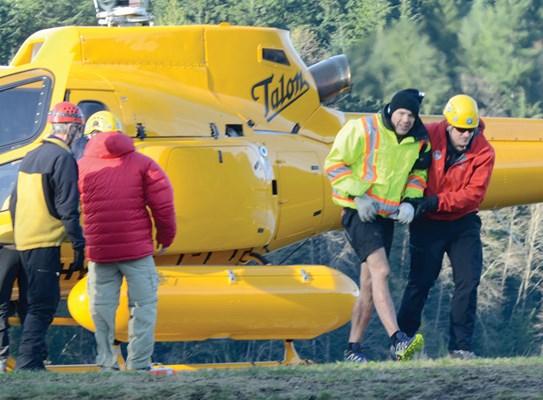AFTER successfully making their 54th and 55th rescues of the year and seeing other search and rescue groups struggling with high call volume, the head of the North Shore Rescue is calling for the province to offer more support.
"What I want to do is open up a very, very meaningful dialogue within the SAR community and government saying 'Listen, the model we have right now is from the 1970s, 1980s and early 90s,'" said Tim Jones, NSR team leader. "It's not reflective of today where we have exponentially increasing recreation taking place throughout the province."
Specifically, Jones would like to see the province offer some money for: standby pay for members of the busiest teams, ensuring there is always a helicopter available when needed, and setting up a communications network that will link up SAR teams.
As the current cadre of SAR responders gets older, it's getting hard to attract new members who can respond at a moment's notice, Jones said, adding that offering on-call pay similar to what paramedics get might do the trick.
"There's a myriad of reasons why that guy might not be available, but if you can entice that individual with pager pay and he can make a stipend to stay there on page and you get a good response, to me, that's the goal of what we're talking about," Jones said.
But rather than offer the pay to all of the province's 2,500 SAR volunteers, Jones said the money should go to units with high call volumes and specific skills sets, and only at peak times.
As for the helicopters, SAR teams currently run the risk that all available choppers will be in use by other agencies, especially during peak wildfire season.
The satellite communications volunteers rely on are no match for radio communications, which would require serious infrastructure investment.
Jones isn't coy about the type of money he's talking about but, he said, the conversation needs to start somewhere.
"To get the communications up and running, a dedicated SAR helicopter, and standby wages, you're looking at tens of millions of dollars to implement this," he said.
"Somebody has to step forward and say 'We have to start thinking (about) a different model' - because the current model is not going to last."
Jane Thornthwaite, B.C. Liberal MLA for North Vancouver-Seymour, where many of NSR's distress calls come from, said she would welcome Jones' proposal and make the pitch for it with the appropriate ministry.
"I would very much like to work with Tim with what the province could do. He's got some really good suggestions." Thornthwaite said.
Though the federal government has recently been defunding the Canadian Coast Guard and relying more on the volunteer Royal Canadian Marine Search and Rescue, Thornthwaite said any discussions about funding improvements to SAR, would have to include the feds.
"Everybody is in a crunch. That's why we'd have to work together as far as priorities to find out what they need first, and perhaps there are opportunities for other levels of government, like the federal government, that we could work with," she said.
"We rely a lot on volunteers for many, many situations and we really respect them, but if the volume of cases is getting too high, I think that all levels of government should sit down and see what we can do."
The province provides $7 million in funding to B.C.'s 80 SAR groups. NSR is typically the busiest group in the province, though Squamish has surpassed them in calls responded to so far this year.
News Photo Mike Wakefield / A North Shore Rescue volunteer assists a hiker who had spent a cold night lost in Hanes Valley in November, 2012. The team's leader says the province needs to do more in the effort to rescue lost and injured adventurers from the backcountry. Scan the photo with the Layar app for more pics of North Shore Rescue in action.;



